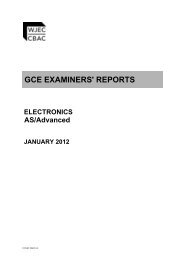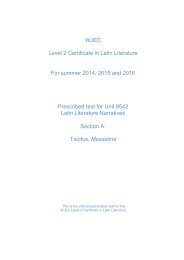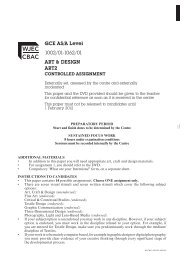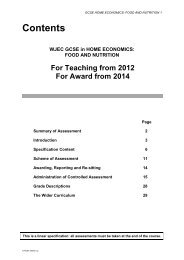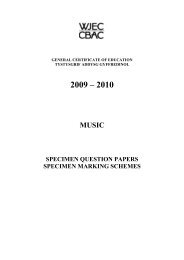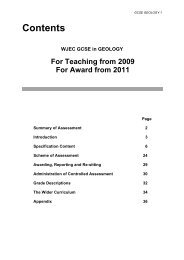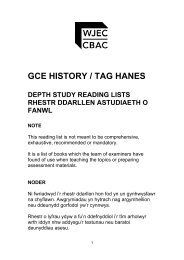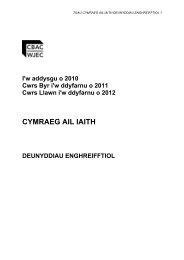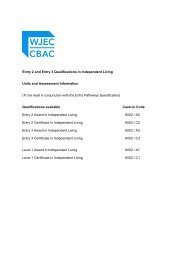WJEC ENGLISH LITERATURE
WJEC ENGLISH LITERATURE
WJEC ENGLISH LITERATURE
You also want an ePaper? Increase the reach of your titles
YUMPU automatically turns print PDFs into web optimized ePapers that Google loves.
Commentary<br />
At first, this short story may seem to have little to do with The Great Gatsby. I<br />
originally intended to set it in America. However, I decided that I wanted to set the story in a<br />
completely different environment that I was able to relate to more closely, but to address<br />
some of the common themes at the same time. I wanted to show that in a way, the message of<br />
the novel is universal.<br />
In the same way that Gatsby idealises Daisy, Jan idealises England. He sees it as<br />
beacon of hope and opportunity, somewhere to start afresh. Gatsby thinks that life with Daisy<br />
will be perfect and pure; he instils in her a lofty perfection which she cannot live up to. Both<br />
characters discover that they cannot reconcile the reality of their situations with their dreams.<br />
I used the flashback device, a technique often used in The Great Gatsby, to recall happier<br />
times and underline the difference between Jan’s image of England and the reality.<br />
I also wanted to portray a sense of hopelessness in my story. The imagery of the tube<br />
tunnels and the use of words like ‘sluggishly’, ‘blurring’ and ‘slow’ is intended to evoke a<br />
sense of inertia. Jan seems to be moving through life aimlessly, his only goal to arrive for<br />
work on time each day. The line ‘He staggered around corners, down stairs and up escalators’<br />
shows the pointlessness of his life. The word ‘labyrinth’ implies a never ending and<br />
frustrating quest. Jan thought that his journey would end happily in England, but he is still on<br />
a journey that doesn’t appear to be leading anywhere. The tube station is a metaphor for his<br />
life. I was inspired by a line in The Great Gatsby - ‘Boats against the current, borne back<br />
ceaselessly into the past’ when writing this part of the story. Jan is floating through life, still<br />
clinging on to an idealised image. The description of his ‘swimming mind’ adds to this idea.<br />
Wealth and material excess is another important part of The Great Gatsby. The jazz<br />
music of Gatsby’s parties represented the hedonism of the Roaring Twenties. However, there<br />
was another side to 1920s America; one of poverty, racism and intolerance. Not everyone<br />
benefited from the economic boom. The jazz music playing from the busker’s radio is<br />
intended to represent the irony of Jan’s situation – he came to England searching prosperity,<br />
but found only poverty. The alliteration and hard plosives of ‘big black bin bag’ create a<br />
gloomy, dark image not normally associated with light-hearted jazz music. I also wanted to<br />
portray the intolerance towards foreigners that also existed in 1920s America. Jan’s rhetorical<br />
questions show his sadness and dismay at the cruel attitude of the teenage boys. The line<br />
‘more xenophobic than most’ shows that he is used to widespread hostility. I also wanted to<br />
evoke pity; the sibilance of ‘dishevelled, semi-conscious…wincing’ is intended to bring out<br />
Jan’s vulnerability.<br />
38



